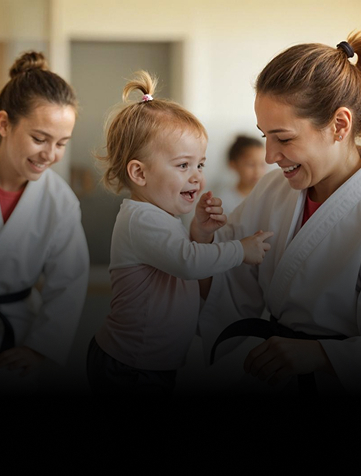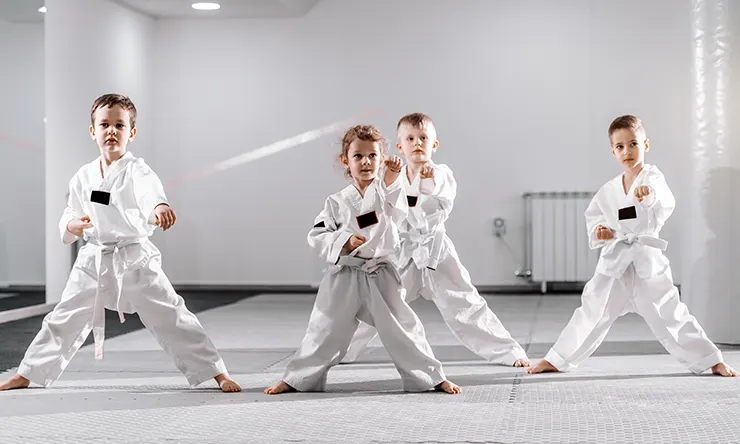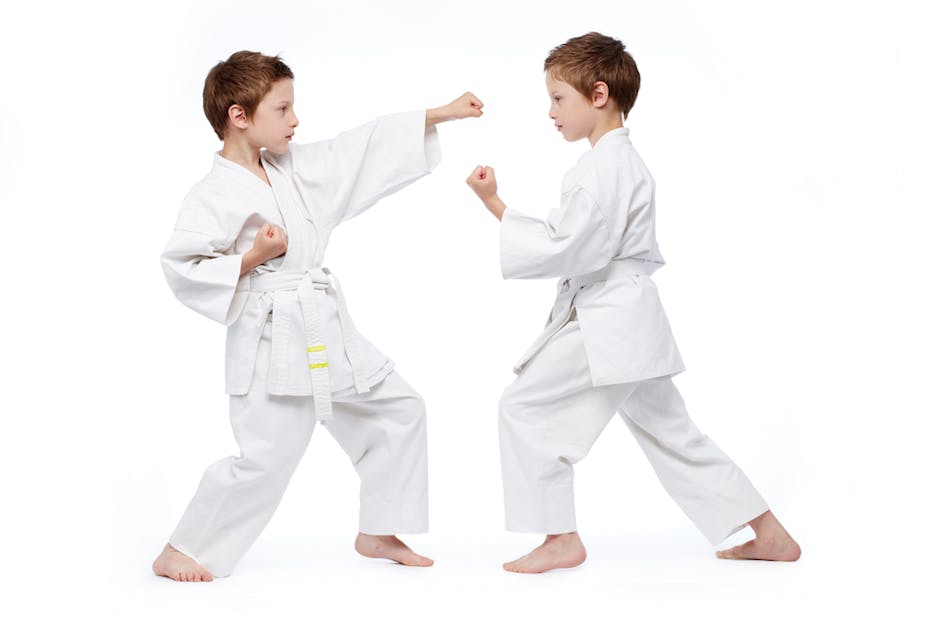Martial Arts for Kids – A Safe, Encouraging Environment for Your Child’s Development
Martial Arts for Kids – A Safe, Encouraging Environment for Your Child’s Development
Blog Article
Just How Karate for Kids Can Increase Self-confidence and Discipline in Youthful Martial Artists
Karate for children provides an one-of-a-kind opportunity to develop self-confidence and discipline in young martial artists. As they discover brand-new techniques and face difficulties, they not just gain skills however additionally develop a strong sense of self-regard. This organized environment motivates them to value the trip of enhancement. But exactly how does this training convert right into their everyday lives? Discover the much deeper links that make karate more than just a sport.
The Value of Self-confidence in Childhood Years Growth
Confidence is a vital structure block in childhood years growth. When you support your child's self-esteem, you empower them to deal with challenges, take threats, and express themselves openly. Kids with self-confidence are a lot more eager to check out brand-new tasks and social scenarios, which can cause enduring relationships and important experiences.Encouraging your child to get out of their comfort area cultivates strength. They learn that failing isn't the end however rather a tipping stone to success. By celebrating their accomplishments, despite how little, you assist them recognize their capacities and worth.In this journey, assistance and favorable reinforcement from you play an essential function. Whether it's with praise or simply existing, your participation boosts their self-confidence. As they expand, this self-assurance becomes a lifelong possession, equipping them to browse both obstacles and opportunities with a solid feeling of self.
Just How Martial Arts Educates Self-control and Emphasis
Martial arts assists you develop discipline and focus via its organized training routine. As you exercise mindfulness during each session, you'll discover to concentrate far better both on and off the floor covering. And also, setting and accomplishing goals in martial arts strengthens your ability to remain fully commited and conscientious.
Structured Training Program
While you engage in karate training, you'll quickly uncover how an organized routine instills discipline and emphasis in young experts. Each class adheres to a specific style, consisting of warm-ups, strategy method, and sparring. This uniformity shows you to appreciate the process and commit to improvement. As you discover types and strategies, you establish a feeling of responsibility for your own progress.The organized setting urges you to set objectives, whether mastering a new belt or refining a kata. You'll find that remaining focused during courses and drills sharpens your focus. The discipline you grow in karate extends beyond the dojo, favorably influencing your schoolwork and daily routines. Each session strengthens the relevance of dedication, helping you turn into an extra self-displined individual.
Mindfulness in Practice
As you practice karate, you'll discover that mindfulness comes to be an important part of your training. Each step needs your complete focus, aiding you stay concentrated on today moment. You'll discover to ignore diversions and focus on your breathing, activities, and purposes. This enhanced recognition develops your reflexes and boosts your discipline.During sparring or kinds, you'll uncover the relevance of being psychologically present - Karate Salisbury MD. You'll notice how this focus not only boosts your strategy yet additionally constructs your self-confidence. By exercising mindfulness in karate, you cultivate patience and resilience, important characteristics that extend beyond the dojo. This way, martial arts shows you to harness your mind, assisting you establish a disciplined approach to obstacles both on and off the floor covering

Personal Goal Setting Techniques
Establishing goals in martial arts isn't practically gaining belts; it's a powerful means to cultivate self-control and focus. When you set details, attainable targets, you develop a roadmap for your development. As an example, rather than simply aiming to enhance your kicks, attempt concentrating on grasping a certain technique every month. This approach keeps you inspired and engaged.Breaking down bigger goals into smaller sized, convenient steps assists you track your progression and celebrate little triumphes in the process. Whether it's improving your position or increasing your sparring endurance, every goal strengthens your dedication. As you attain these goals, you'll build confidence in your abilities and create a solid sense of discipline that prolongs beyond the dojo right into day-to-day life.
Structure Strength Through Martial Arts
Fighting style, specifically martial arts, uses children an one-of-a-kind possibility to build strength in an encouraging environment. In classes, they encounter challenges that press their limits, whether it's mastering a new technique or sparring with a partner. Each setback, like a missed kick or a lost suit, comes to be a chance to find out and grow.As they exercise, children find out to accept discomfort and keep trying, even when points obtain hard. They find that failing isn't completion; it becomes part of the journey. This way of thinking aids them jump back stronger, not just in the dojo, but in day-to-day life.With each obstacle they get over, your kid develops confidence in their capacity to take on challenges, fueling their determination. Via martial arts, they'll comprehend that resilience isn't almost physical stamina; it's regarding mental grit and willpower, equipping them to deal with whatever life throws their means.
The Function of Respect in Martial Arts Training
Regard is a foundational principle in karate training, cultivating a culture of discipline and friendship among pupils. When you step onto the dojo flooring, you're not just learning methods; you're also finding out to appreciate your teachers, peers, and the art itself (Karate Salisbury MD). Bowing at the start and end of class isn't simply a formality; it represents your acknowledgment of others' dedication.as and efforts you establish mutual regard, you'll find it improves your knowing experience. You'll pay attention much more diligently to your instructor and gain understandings from fellow students. This atmosphere urges useful objection and support, enabling everyone to grow together.Moreover, regard cultivates self-discipline. Identifying the value of tough job and humility aids you stay focused on your training. Subsequently, this respect equates right into your everyday life, enhancing your communications and relationships outside the dojo. With martial arts, you learn that respect is essential for personal development and community building
Attaining and setting goals Success in Martial arts

Social Skills and Synergy in the Dojo
While training in the dojo, children normally establish vital social skills and teamwork capacities. As they exercise together with peers, they learn to connect properly, share area, and support each other. Each course provides chances for collaboration, whether it's throughout companion drills or group workouts. This team effort fosters relationships and produces a sense of belonging, making the dojo a nurturing environment.Kids additionally get important conflict resolution abilities. When they come across difficulties, such as disagreements throughout sparring, they learn to browse these circumstances constructively. They practice patience and compassion, comprehending that everyone has various strengths and weaknesses.Moreover, joining group see this website tasks cultivates a feeling of responsibility. You'll see your child discovering to rely on colleagues and take responsibility for their function in a group. These experiences not just boost their martial arts trip however additionally equip them with social devices they'll lug into various other areas of life.

The Long-Term Perks of Karate Beyond Youth
As children expand up and shift right into the adult years, the benefits of karate prolong much past the dojo. You'll find that the self-control and emphasis found out through karate can equate right into your scholastic and professional life. Establishing and attaining goals in martial arts fosters a strong job values, which can press you to excel in any endeavor.Moreover, the self-confidence gained from grasping techniques and sparring can boost your self-worth, aiding you tackle obstacles head-on. This strength comes to be very useful as you deal with the unpredictabilities of adulthood.Additionally, the social skills created via teamwork and camaraderie in the dojo can result in much better connections in both expert and personal spheres. You'll learn to communicate effectively, resolve conflicts, and construct an web encouraging network.Ultimately, karate forms not simply knowledgeable martial musicians, however all-round individuals ready to take on the globe.
Regularly Asked Concerns
What Age Is Finest to Start Martial Arts for Children?
You can start martial arts as early as age four or 5, however it commonly depends upon your child's maturation and passion. Discovering a class that matches their age and power level makes a big distinction.
Are There Any Wellness Benefits From Exercising Karate?
Yes, practicing karate deals various health advantages. You'll enhance your flexibility, toughness, and sychronisation while boosting cardio fitness. And also, it enhances emphasis and mental wellness, making it a great selection for overall physical and psychological health.
Exactly How Often Should Youngsters Attend Karate Courses?
You should motivate your kids to go to karate courses a minimum of 2 to 3 times a week. Consistency aids them find out methods properly and develop skills, making their experience much more rewarding and delightful in the long run.
Can Karate Assist With Managing Anxiousness in Children?
Yes, martial arts can help handle stress and anxiety in youngsters. It shows emphasis and self-discipline while supplying a risk-free outlet for energy. You'll observe your kid expanding extra calm and certain as they exercise on a regular basis.
What Gear Is Required for Children Beginning Martial Arts?

Report this page